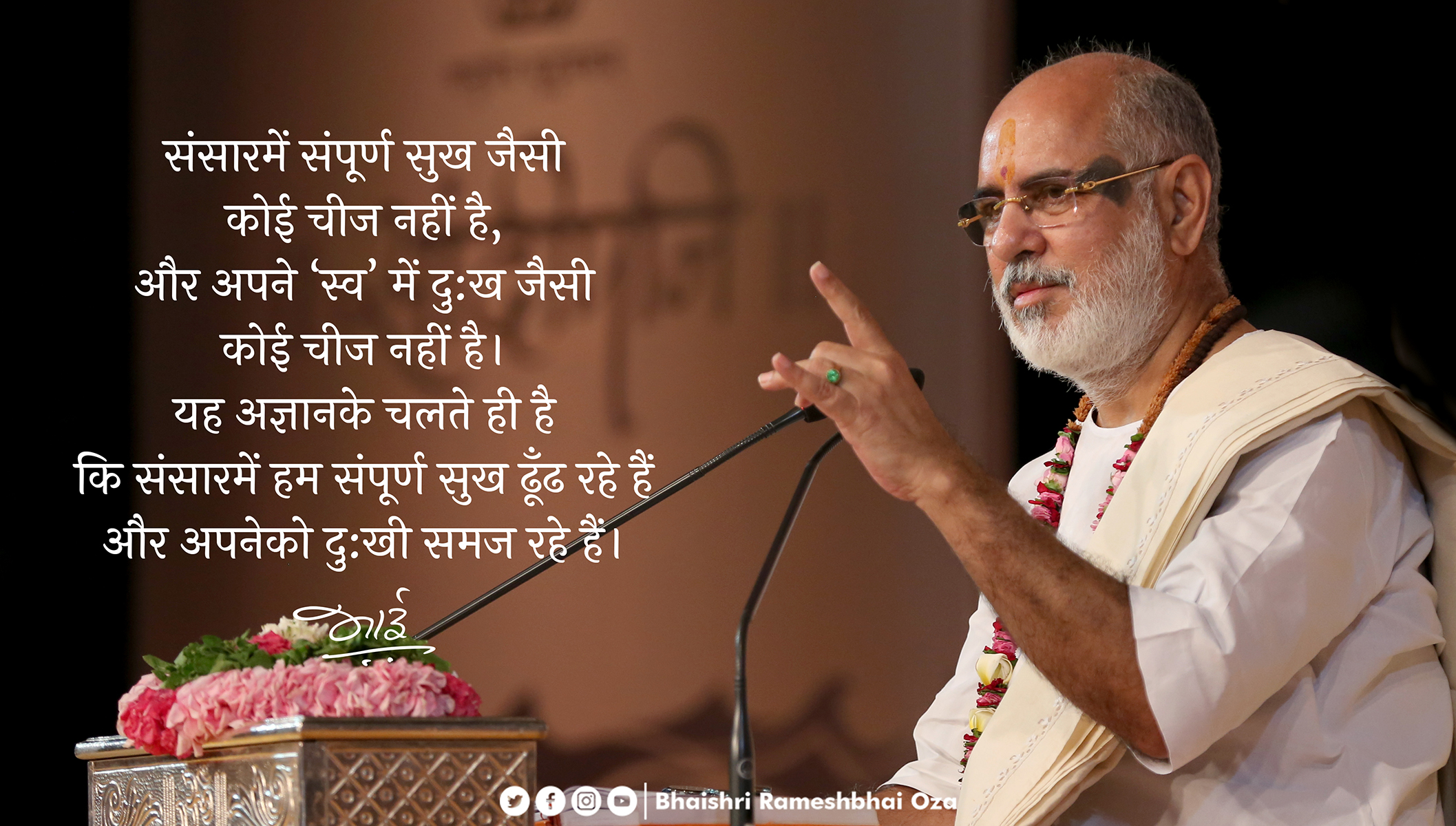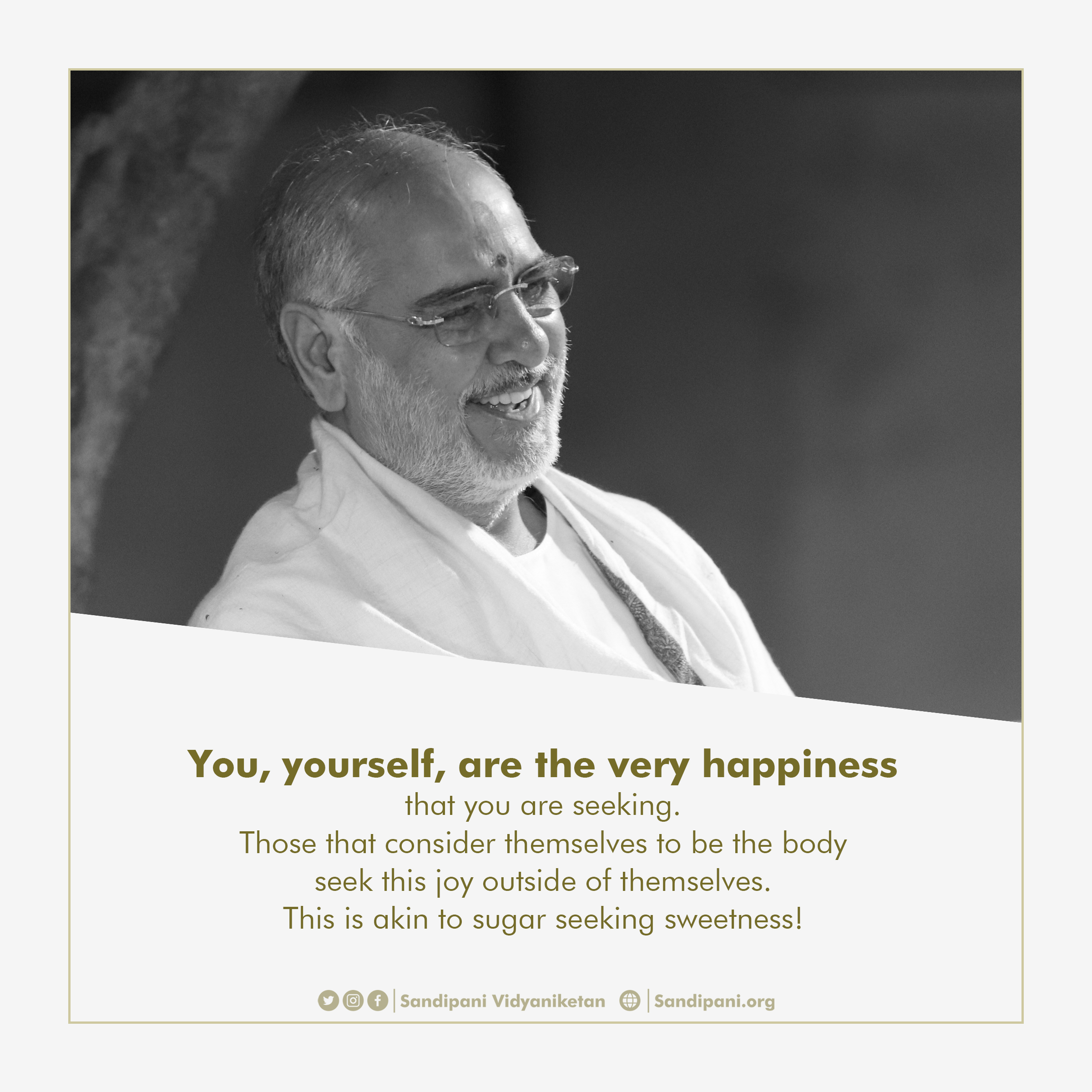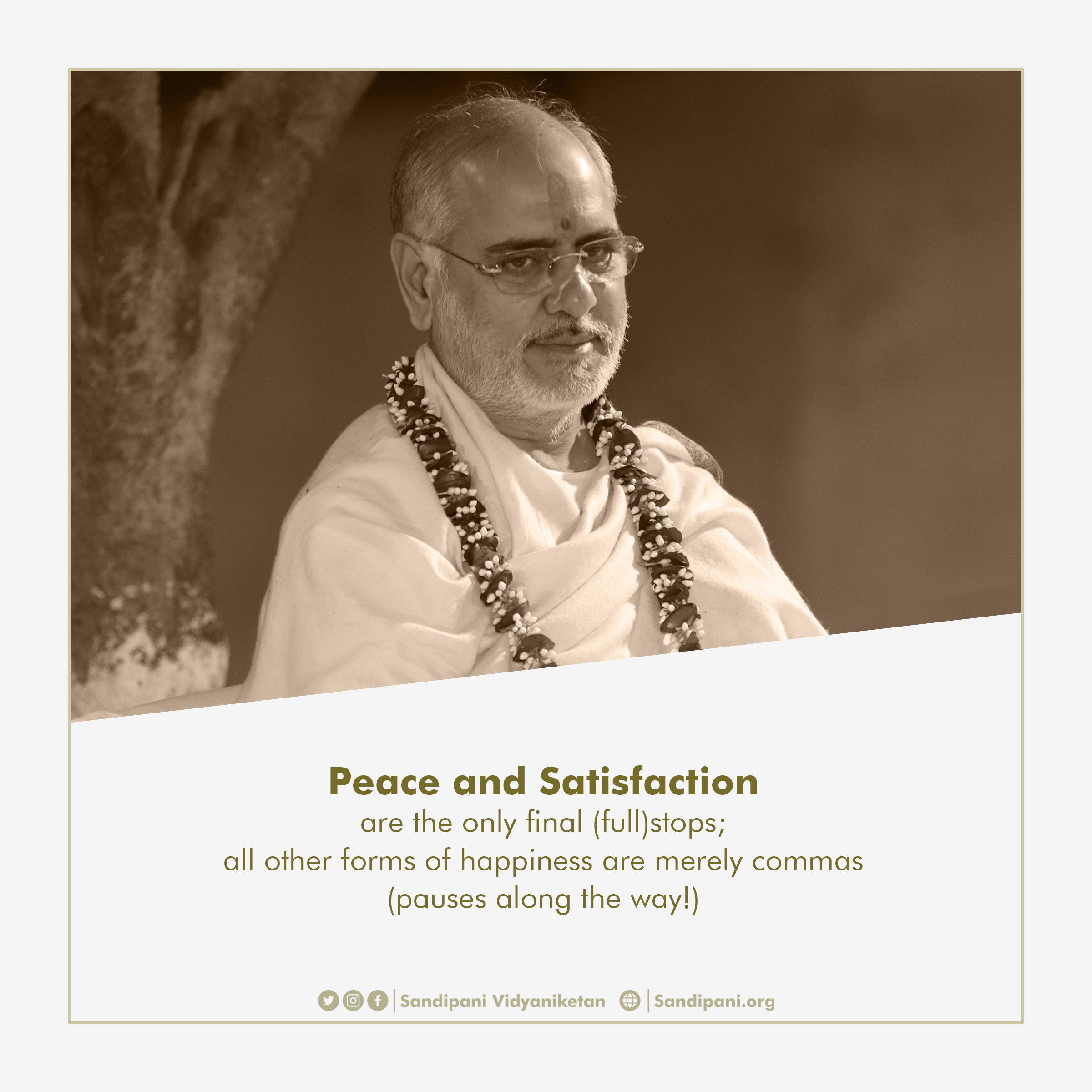Man’s Quest for Lasting Happiness
An International-Day-of-Happiness Special | March 20, 2021
‘Happiness. Bliss. Peace. The burning desire for these is certainly Universal, yet the earnest ‘quest’ for these often appears to be in vain. When the Lord is described to be an infinite storehouse of happiness and an ocean of bliss, and if all living beings are a part of the Supreme Being, how can one’s own essence appear to be so out-of-reach?
The Lord, an Ocean of Bliss
jo ānaṃda siṃdhu sukharāsī |
sīkara te trailoka supāsī ||
Rāmcaritamānasa | Bālakāṇḍa | Dohā 196 | Caupāī 3
Why doesn’t ‘Happiness’ (as we know it) last?
We all want infinite and independent happiness, yet we mistakenly seek it in the objects and experiences of this finite material world (saṃsāra). Such happiness is not true happiness, but merely a mirage of genuine joy (sukhābhāsa)—dependent upon people, place or object, and thus, fleeting in nature. The world is made of duality and consequently, every worldly joy is inevitably connected to sorrow; whilst the Self is non-dual and thus, ever blissful by its nature. There is no such thing as sorrow in the Self, and no such thing as ‘complete happiness’ in this world! How does one progress inwards towards lasting and genuine joy? By seeking joy at its source (the Self) rather than in its reflection (the world).

Rise in ‘Happiness Index’
Pujya Bhaishri Rameshbhai Oza places emphasis on the teachings of the Upaniṣad to not be satisfied with merely the lower sensory pleasures (viṣayānanda). Rather, one must press forth in one’s quest to seek that ultimate happiness of the Self (brahmānanda), as depicted in the following inspiring story of a Saint, and the journey from rags-to-riches and beyond, of a humble woodcutter.
The Story of the Saint and the Woodcutter
There was a woodcutter who cut and sold wood for a living. One day, when he went to the forest to cut wood, he met a saint who was practicing austerity. The saint blessed him, and after a couple of days asked the woodcutter, “What are you doing?” The woodcutter replied, “I’m a woodcutter. I eke out a humble living out of cutting and selling these logs.”
The woodcutter came everyday and began to serve the saint. His simplicity and humility pleased the saint, who one day asked him, “Do you make enough to run your household?”
“I’m a poor man but we somehow find a way to make ends meet.”
The saint graciously guided him, saying, “Go deeper into this forest—you will find sandalwood trees there. You will make more money if you sell sandalwood.”
The woodcutter followed the Saint’s words and found valuable sandalwood trees there. He started selling this premium wood and his earnings rose. He had new garments stitched for himself and his family, and upgraded his mode of transport to a motorcycle.
Every once in a while the saint would urge the woodcutter to delve deeper into the forest, telling him not to be satisfied with so little; to aim for greater heights of happiness.
The woodcutter faithfully followed his instructions and as he continued to press on, he progressively discovered silver, then gold, and then diamonds. He had now become a successful jet setting international businessman with more wealth than he had the time or capacity to fully enjoy himself, or with his wife.
When the saint once again encouraged the woodcutter to continue further inside, the woodcutter was perplexed: “Bāpu, saints teach us not to be greedy and to be satisfied with what we have. Why are you teaching me the opposite?”
Undaunted, he respected the saint’s instructions and continued—until one day he suddenly reached a place of such beauty and serenity that he finally experienced an effortless inner connection and deep peace.
“Go further inside, go further inside.”

Entering into the Oasis of Peace in the Forest of the Self, with the Grace of the Guru
The woodcutter had today realised the real meaning behind the Saint’s words: the forest is a metaphor for ourselves. We have to keep progressing in our search for happiness, rather than being satisfied with the outer treasures; until the true inner treasure of the forest has been discovered—the fullness of our Self (ātma-sukha).
This is made possible by trust (viśvāsa) and faith (śraddhā) in the words of the wise saint who urges the woodcutter to not stop, until he attains the greatest treasure. The Guru who has attained this treasure and thus, knows the true worth of the infinite treasure ahead, is vital to attaining this greatest inner treasure.
Whilst indulging in material and sensory pleasures (viṣayānanda) may give us temporary happiness by fulfilling our desires, these desires by their very nature are ever-filled with further desires, and ceaselessly drive us further away from satisfaction and the peace of our Self.
Why Settle for Less than the Highest Form of Happiness, ask our Rishis?
The Upaniṣads urge one to aim for the highest goal. We should expand our desires to aim for the greatest of all joys. That, which once attained, leaves nothing further to be desired or attained.
यो वै भूमा तत्सुखं नाल्पे सुखमस्ति भूमैव सुखं भूमा त्वेव विजिज्ञासितव्य इति भूमानं भगवो विजिज्ञास इति ॥ ७.२३.१ ॥
yo vai bhūmā tatsukhaṃ nālpe sukham asti bhūmaiva sukhaṃ bhūmā tveva
vijijñāsitavya iti bhūmānaṃ bhagavo vijijñāsa iti || 7.23.1|| (Chāndogyopaniṣad)
The Sanatkumāras say: ‘That which is infinite is the source of happiness. There is no happiness in the finite. Happiness is only in the infinite. But one must try to understand what the infinite is.’ Nārada replied, ‘Sir, I want to clearly understand the infinite’.
This is the inner journey that leads to a direct experience of the Self as Bliss (known as ‘brahmānanda’). Our mind shrinks when facing outwards, and expands by turning inwards. The only instrument needed for this is faith in the words of the Guru, and a heart purified by Satsaṃga or association with Truth.
Has the Goal been Realised? Distinguishing the ‘Commas from the Full Stop’
This joy of Self is not finite like material pleasures, nor is it dependent on any external source for its attainment. Joy of Self is innate, complete and wholly independent of any person, place, object or prestige.

This Bliss leaves one eternally fulfilled and fearless.
- To watch the full story narrated in detail by Pujya Bhaishri’s words, click here
- To submit your views on ‘What is Happiness’ (Kim Sukham) click here
Post compiled by Shivani Suchak & Nimisha Sadhu